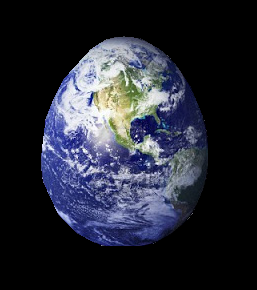 The symbolism of Easter offers an opportunity to reflect deeply on the shift of consciousness required to extricate ourselves from the horrors of climate change and the tragic state of environmental degradation we have created. We need the kind of philosophical and psychological insights that will enable us to extricate ourselves from the age of the Anthropocene, a time when human activities are having a significant adverse global impacts on Earth's geology and ecosystems.
The symbolism of Easter offers an opportunity to reflect deeply on the shift of consciousness required to extricate ourselves from the horrors of climate change and the tragic state of environmental degradation we have created. We need the kind of philosophical and psychological insights that will enable us to extricate ourselves from the age of the Anthropocene, a time when human activities are having a significant adverse global impacts on Earth's geology and ecosystems. The egg is a prominent symbol of Easter and a fitting metaphor for the Earth. An egg symbolizes the promise of new life and at the same it is fragile and can be easily broken. As a festival celebrating the return of spring and as a Christian holiday, Easter calls us to remember the cycles of renewal and the interconnectedness of life and death.
Above all, Easter symbolizes rebirth, and renewal. From an ecological perspective this is precisely what is required as we engage the serious work of being better environmental stewards. A number of symbols have become part of the Easter tradition. Some are directly related to the life of Jesus Christ and other date back to pagan traditions.
For Christians, Easter is a celebration of Christ's resurrection, the ultimate symbol of rebirth. Easter's known pagan roots date back to the 8th century, specifically an Anglo-Saxon fertility goddess known as "Eostre," whose name may be derived from "eastre," meaning spring.
The Easter Egg is taken from Celtic and Teutonic pagan traditions. Eggs are directly associated with springtime festivals in many older texts and narratives. From a Christian perspective, Easter eggs are said to represent Jesus' emergence from the tomb and resurrection.
Decorating eggs for Easter is a tradition that dates back to at least the 13th century. One explanation for this custom is that eggs were formerly a forbidden food during the Lenten season, so people would paint and decorate them to mark the end of the period of penance and fasting, then eat them on Easter as a celebration.
Judaism celebrates Passover around this time of year and it commemorates the Hebrews' escape from Egyptian enslavement. This is metaphorically relevant to ecology as a symbol of freedom from the bondage of environmental destruction.
With so many around the world seeking to renew our relationship to the Earth, Easter is particularly relevant in modern times.
Easter is an opportunity to reconsider our relationship to this planet, and a good time to reflect on the truly transformational work that lies ahead. Easter is also an aspirational homage to the possibility that we can live in harmony with our environment.
Related Articles
A Thanksgiving Infused with Environmental Gratitude
Why We Need a New Climate Change Narrative
Overcoming Obstacles in the Creation of a New Climate Narratives
Crafting a Positive Environmental Narrative
Pessimism is Impeding Environmental Advocacy
A New Environmental Movement Breeds Hope for the Future
Environmental Success Stories: Mercury, SLCPs and Many More
Forging a New Climate Change Narrative: Addressing 5 Psychological Realities
0 comments:
Post a Comment